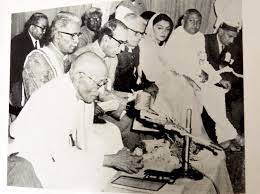The Swatantra Party was a political party in India that was founded in August 1959. The party was formed with the objective of promoting individual freedom and liberal economic policies. The Swatantra Party was the main opposition party in the Indian parliament during the 1960s and was known for its advocacy of free-market principles.

The Swatantra Party was founded by C. Rajagopalachari, who was the first Indian governor-general of India. Rajagopalachari was a prominent Indian politician who had previously served as the chief minister of Madras (now Tamil Nadu) and the governor of West Bengal. He was also a respected writer and scholar.
The Party was founded in response to the dominance of the Indian National Congress, which had been in power since India gained independence from Britain in 1947. The party sought to provide an alternative to the Congress’s socialist policies and was critical of the state’s intervention in the economy. The Party was inspired by the classical liberal ideas of economists such as Friedrich Hayek and Milton Friedman.
The Party was a pro-business party that favored the promotion of private enterprise and free trade. The party was also supportive of individual freedom and opposed the state’s control over the lives of citizens. The Swatantra Party believed that the government’s role should be limited to providing basic services such as law and order, defense, and infrastructure.
The Swatantra Party was successful in several state elections in the 1960s, and its members were elected to the Lok Sabha (the lower house of the Indian parliament) and the Rajya Sabha (the upper house) as well. The party’s most significant success came in the 1967 general election, where it won 44 seats in the Lok Sabha.
The Swatantra Party was also known for its support of Hindu nationalism and was critical of the Indian National Congress’s appeasement policies towards Muslims. The party’s stance on this issue caused controversy and led to accusations of communalism.
However, the Party declined in popularity in the 1970s, and most of its members joined the Janata Party, which was formed in 1977. The Janata Party, which was an alliance of several opposition parties, defeated the Indian National Congress in the 1977 general election.
In conclusion, the Party was a significant political force in India during the 1960s. The party was known for its advocacy of free-market principles, individual freedom, and opposition to state intervention in the economy. The Swatantra Party provided an alternative to the Indian National Congress’s socialist policies and was successful in several state elections. However, the party declined in the 1970s and eventually merged with the Janata Party.
Important Links